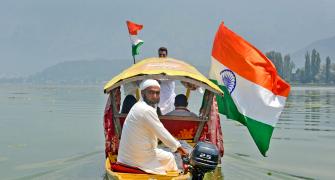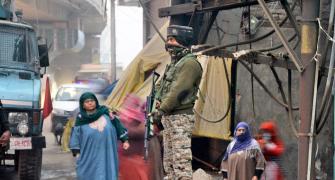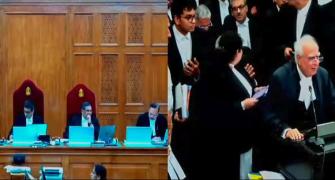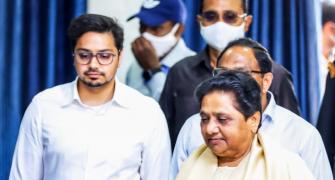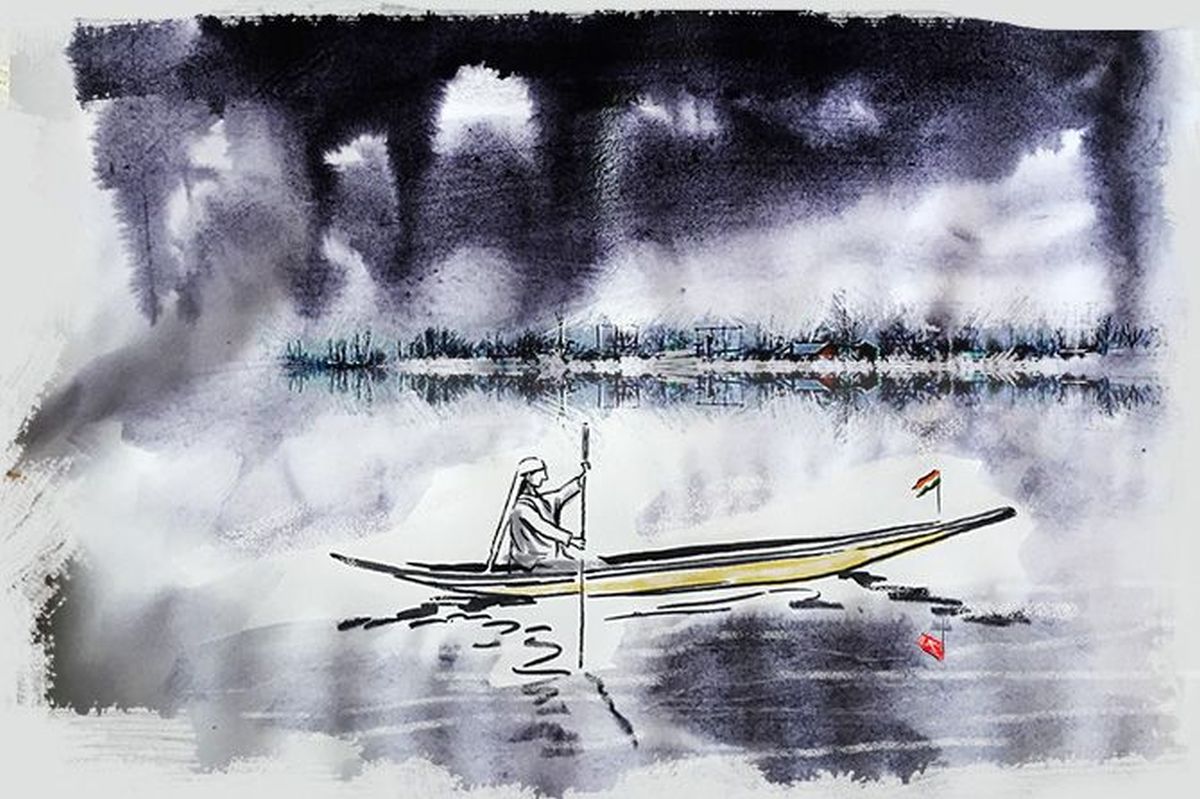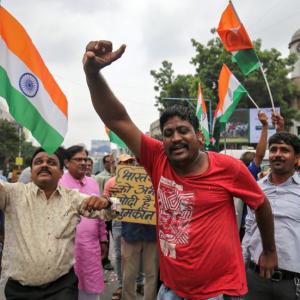'Article 370 laid down the edifice of the relationship between J-K and the Union of India.'
'If you look at the Article, what is there now is a provision which states that all provisions of the Constitution of India applies to J-K.'
'The veto that the state could exercise previously on most Union laws has ended.'
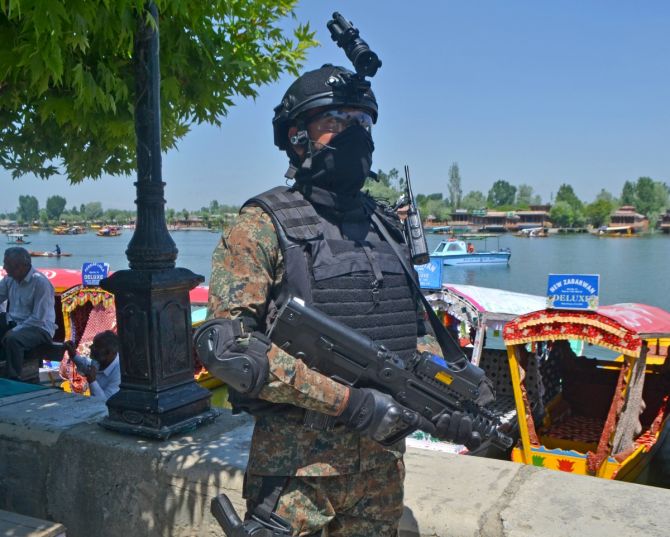
This week, a Constitution Bench of the Supreme Court commenced hearing a batch of pleas challenging the Centre's August 5, 2019, decision to revoke the special status granted to Jammu and Kashmir under Article 370 of the Indian Constitution.
The five-judge bench headed by Chief Justice of India Justice Dr Dhananjay Yeshwant Chandrachud has been posing questions regarding the abrogation of the Constitutional provision that bestowed special status on the erstwhile state.
Last year, Navi Books, an initiative of Vidhi Centre for Legal Policy had published Hamīñ Ast: A Biography of Article 370 (external link), which was authored by Arghya Sengupta, Jinaly Dani, Kevin James and Pranay Modi.
Discussing his book with Rediff.com's Utkarsh Mishra, Arghya Sengupta, founder and research director at Vidhi, discussed the circumstances in which this special provision was made in the Constitution, and why it was applied only to the state of Jammu and Kashmir.
The first of a two-part interview:
while we say that Article 370 has been abrogated, isn't it true that only part of it was repealed and, as the book says, 'without Article 370, the entire edifice of the substantive relationship between J-K and India would collapse in one stroke'?
It's incorrect to say that Article 370 has been abrogated.
That is why in our book we use the term 'nullified'. This means that the 'special relationship' between Jammu-Kashmir and the Union of India has been brought to an end.
If you look at the Article, what is there now is a provision which states that all provisions of the Constitution of India applies to Jammu and Kashmir.
So, the substantive relationship has been brought on par with other states in India. The Article exists and is testament to that.
Apart from ending its special status, thereby taking away the right to a separate flag and constitution, what more constitutional changes did this move bring to J-K?
Article 370 laid down the edifice of the relationship between J-K and the Union of India. That edifice was built on the principle that it takes two hands to clap.
Any decision regarding J-K would require the Union of India and the representatives of J-K to consult each other or concur with each other, ie, the state had autonomy.
That autonomy has ended and the state will be like any other state in the country.
Matters on the Union List of the Constitution like aircraft, banks, insurance etc will be governed from New Delhi; matters on the State List like police, hospitals etc will be governed from Srinagar and matters on the Concurrent List like education by both.
The veto that the state could exercise previously on most Union laws has ended.
What this also means is that Article 35A, which gave special protections to permanent residents of Jammu and Kashmir in government jobs, scholarships and limited buying of property in the state to such permanent residents has also ended.
If a temporary provision was made for J-K pending the people's decision on integration with India, then why was the will of the people of Jammu and Ladakh not taken into account, who were demanding complete integration?
The will of the people of the entire state of J-K including Ladakh could never be taken into account because a plebiscite could never be held.
This is because on 1 January 1948, a ceasefire was called and the LoC was created with one section of the state held by armed tribesmen from Pakistan.
Without the state fully being in control of the Union of India, the government refused to hold a plebiscite because it could not guarantee its fairness.
So a de facto division was arrived at (with the LoC remaining under the control of Pakistan) and that is the arrangement that continues.
The book walks us through the widespread belief within the Indian leadership that the status of Jammu-Kashmir being different from other princely states, it requires a separate constituent assembly, as it didn't have any representative in the Constituent Assembly of India for the most part.
But why were no such concessions provided to states in a similar situation like Hyderabad? How was J-K, in legal terms, a unique princely state in India?
J-K was unique in the sense that it was a Muslim majority state with a Hindu maharaja.
The two other 'outlier states' -- Junagadh and Hyderabad -- were the opposite -- Hindu majority states with Muslim ruling families.
Second, its geographical location was unique, placed strategically near the Silk Route, bordering Tibet and the southern regions of the USSR (the then Soviet Union), site of the Great Game.
Third, it was bordering the newly created State of Pakistan with a large number of people (particularly in Gilgit-Baltistan) who wanted to be part of Pakistan.
Above all it was unique because as on August 15, 1947, it had acceded to neither India nor Pakistan.
As we point out in the book, Maharaja Hari Singh had designs on making it a neutral 'Switzerland of the East'. So all in all, it was a fairly unique set of circumstances that applied in the state.
It was intriguing to read that 'without the J-K Constituent Assembly', the Constituent Assembly of India could not make any 'final provision bringing Jammu and Kashmir in line with other princely states'. Did any other state get this privilege?
This was a unique privilege given to J-K because Lord Mountbatten, as governor-general of independent India, when accepting the accession of J-K had said that the future of the state of J-K would be determined by the 'will of the people'.
Accordingly, this provision was put in place. The integration of other states did not have this special condition of acceptance.
The predicament of the then ruler of Kashmir in acceding to either dominion can still be understood, but what was the legal basis for Sheikh Abdullah not wanting to be a part of the Indian Constitution?
The lapse of paramountcy didn't give him any such powers, so how could he demand a veto over which part(s) of the Indian Constitution applies to the state of J-K?
Sheikh Abdullah was the 'prime minister' of Jammu and Kashmir.
Legally speaking, the decisions on the future of J-K would be taken by the maharaja as per advice of the prime minister and his cabinet.
It is not correct to say that Abdullah did not want to be 'part of the Indian Constitution'.
He was a member of the Constituent Assembly and played a role in drafting it. He also was in agreement with large parts of Article 370, though he had some quibbles about the final draft.
In fact, he entered into the Delhi Agreement with Nehru which more firmly entrenched the status of J-K in the Union of India. So the factual premise of this question isn't correct.
Sheikh Abdullah was even opposed to the Preamble and the chapter of Fundamental Rights being applied to J-K. It was not like other states didn't have people who have distinct cultures and identities, but no one put forth any such demand.
We must remember that J-K was differently positioned from other states as discussed above.
Abdullah was bargaining about which parts of the Constitution should apply to J-K.
This was in consonance with what the Union government itself had promised J-K so it may not be correct to blame him.
Other princely states had, by that time, already been integrated. The position of British Indian provinces, as we know, was entirely different.
After the Delhi Agreement between Nehru and Sheikh Abdullah, the India government was not ready to issue a resolution confirming Kashmir's accession to India as, the book says, 'it would not bode well for India at the UN' where the issue was still pending.
How could India make it a bilateral issue in 1971 as part of the Simla Accord, forbidding the intervention of a third party?
Much water had passed under the bridge by 1971, including multiple wars with Pakistan.
In 1952, it was still being hoped that the United Nations would resolve the matter and India did not want to aggravate it.
But once it was clear that there would be no remedy from the UN, and the Shimla Accord had been signed, India took its stand that the issue was bilateral -- one it has maintained more or less consistently over time.
- Part II of the Interview: Why Article 370 Failed To Protect Kashmiri Pandits

